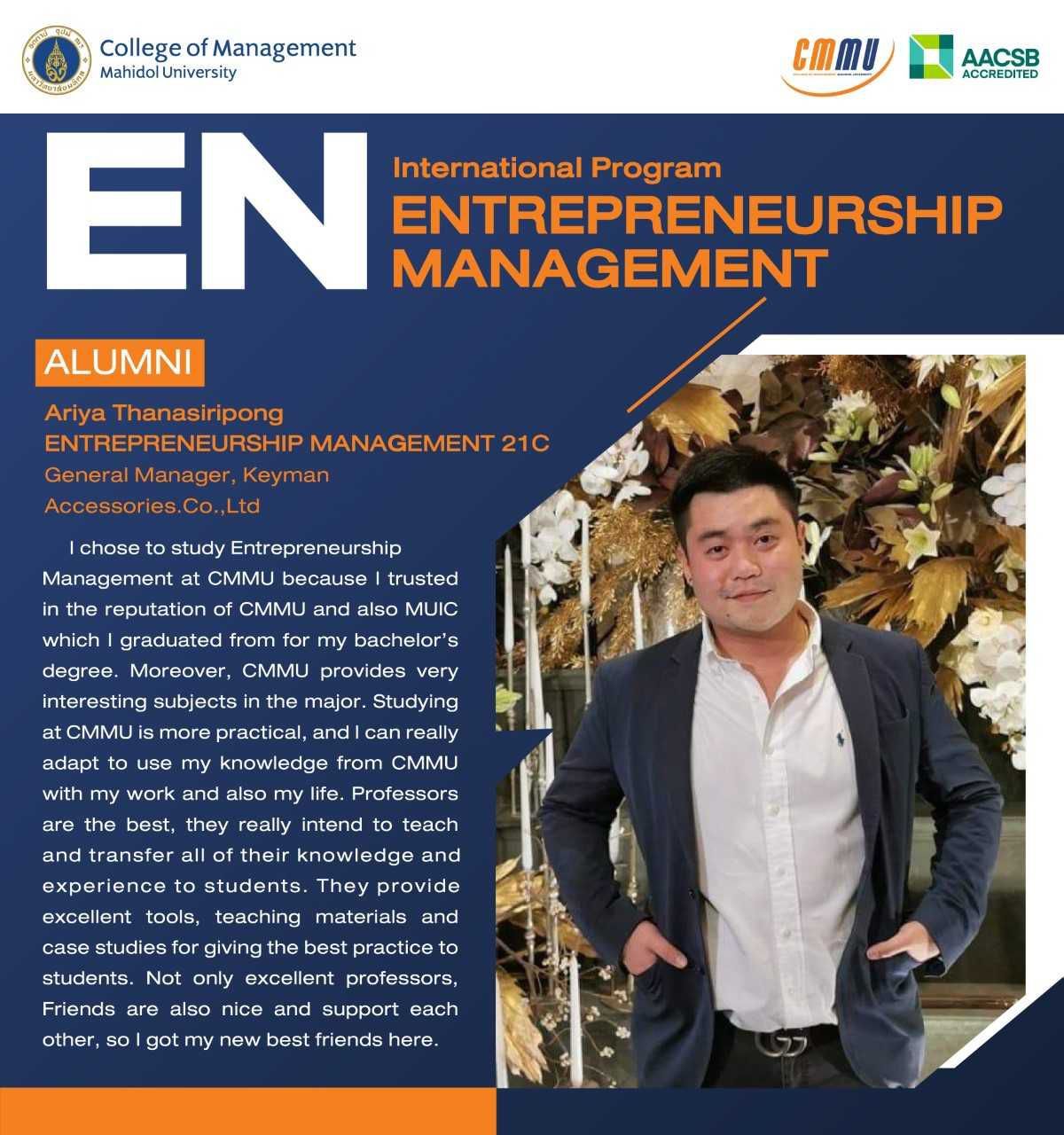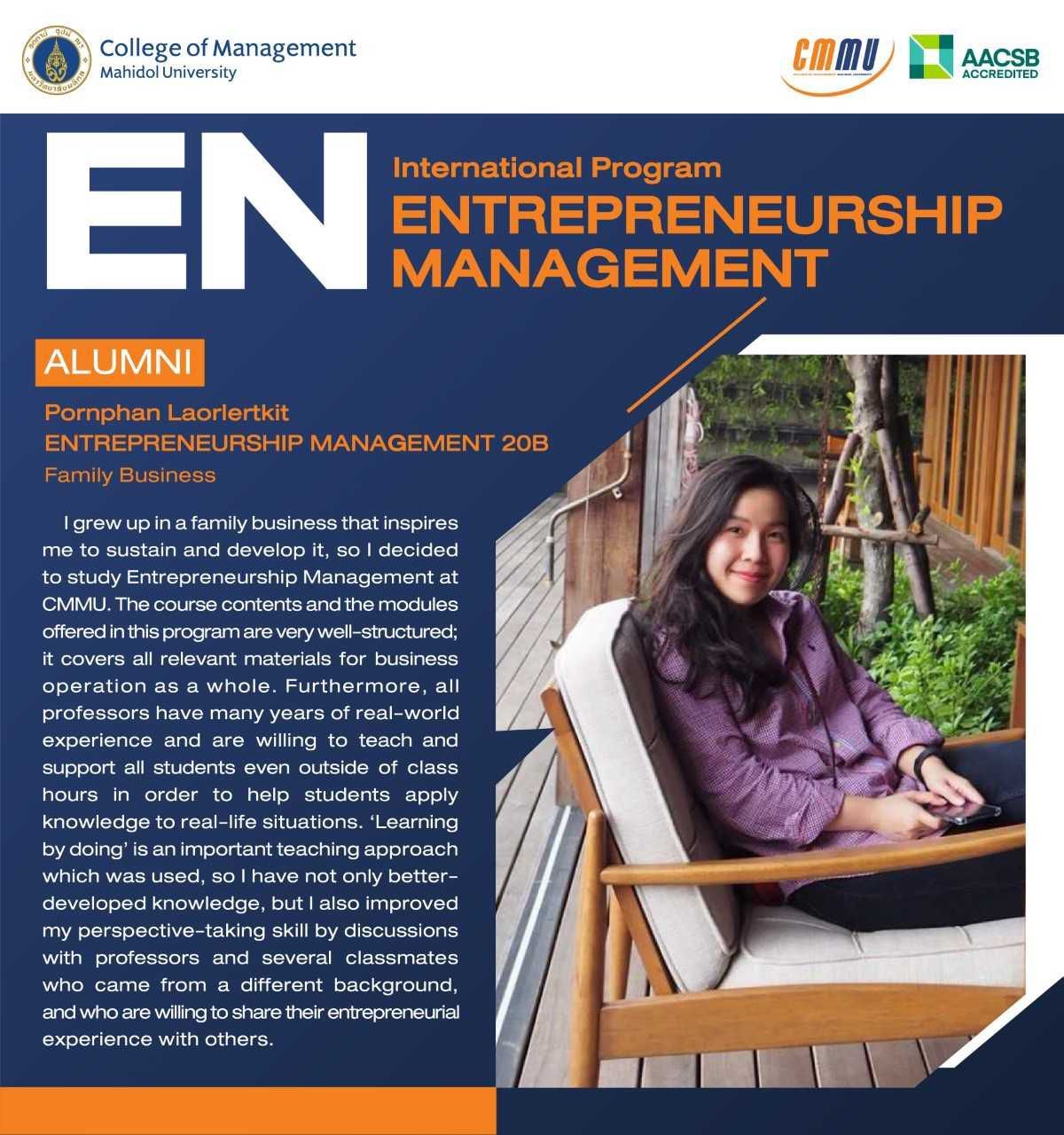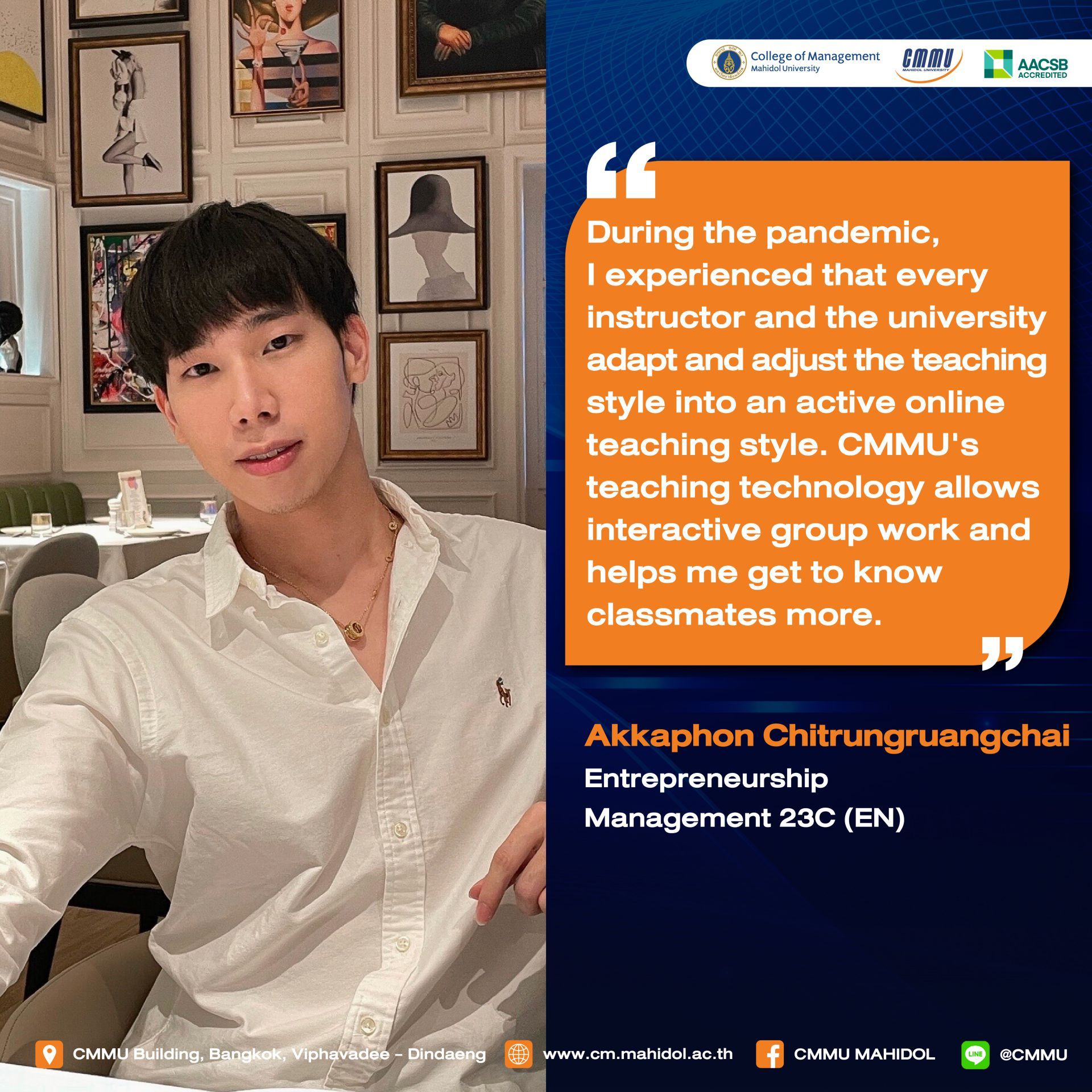Program Selection
International Programs
Thai Programs
Online International Programs
Doctoral Degree Program
ENTREPRENEURSHIP MANAGEMENT (EN)
INTERNATIONAL PROGRAM
Empowering Visionaries, Shaping the Future of Business.
- Business Design & Investor Pitching Strategies
- Effective SME Management & Navigating Family Business Succession
- Unlocking Creativity & Driving Innovation
"Transforming Ideas into Impactful Enterprises."
Do you want to be the master of your own destiny? CMMU’s EN program—the pioneer of entrepreneurship education in Thailand—provides all current and future entrepreneurs with the managerial skills they need to develop ideas into successful companies. The EN mission is to inspire and empower the next generation of entrepreneurs to create, grow, and sustain impactful ventures—nurturing innovation, resilience, and leadership at every stage of the entrepreneurial journey.
Associate Professor
Simon Zaby, Ph.D.
EN Program Chair, Full-Time Faculty

Start-Up Founder, CEO, Managing Director, Family Business Founder and Successor, SME Manager, Corporate Executive, Digital Business Founder and Manager, Business Owner, Business Angel, Venture Capitalist
WHO SHOULD TAKE THIS SPECIALIZATION?
- Future entrepreneurs: people with a dream to start up their own company; people who want to learn how to identify and evaluate business opportunities; people who want to develop winning business plans
- Current entrepreneurs who want to grow and sustain their self-owned business
- Current family business managers who want to create and interpret customer needs and quantify the value proposition
- Future family business leaders (family business successors) who want to learn from instructors with their very own entrepreneurial experience
- Any managers in companies. All corporations require entrepreneurs. Contents learned in the EN program leave your future career path flexible.
- People who are interested in building strong and diverse networks with graduates, successful entrepreneurs, professors, senior managers, and funding agencies. Networking is a vital core of the journey in CMMU’s EN program.
WHY ENTREPRENEURSHIP MANAGEMENT (EN) IN CMMU’s MASTER OF MANAGEMENT INTERNATIONAL PROGRAM?
HIGHLIGHT COURSE

SPECIALIZATIONS
CONTACT ADMISSION TEAM
-
662 206 2000 ext. 3102 or 3104
-
cmmumahidol
-
Line Official: @cmmu
-
This email address is being protected from spambots. You need JavaScript enabled to view it.
What is it like to study at CMMU?
HEAR OUR STUDENTS’ VOICES
Entrepreneur
Managing Director
Join & Coin Corp. Co., Ltd.
Hybrid Study @ CMMU
LATEST PROGRAM ACTIVITIES
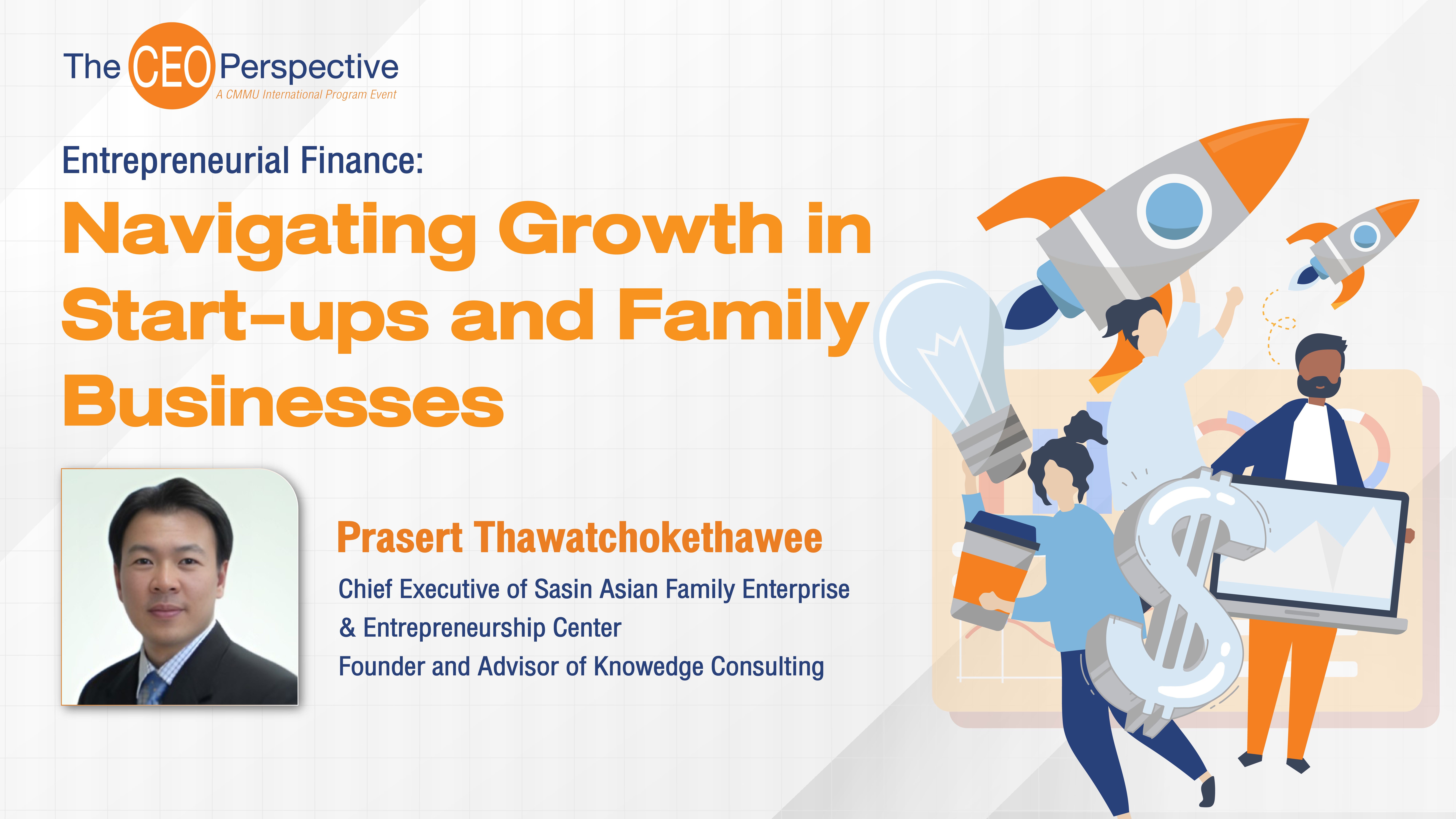
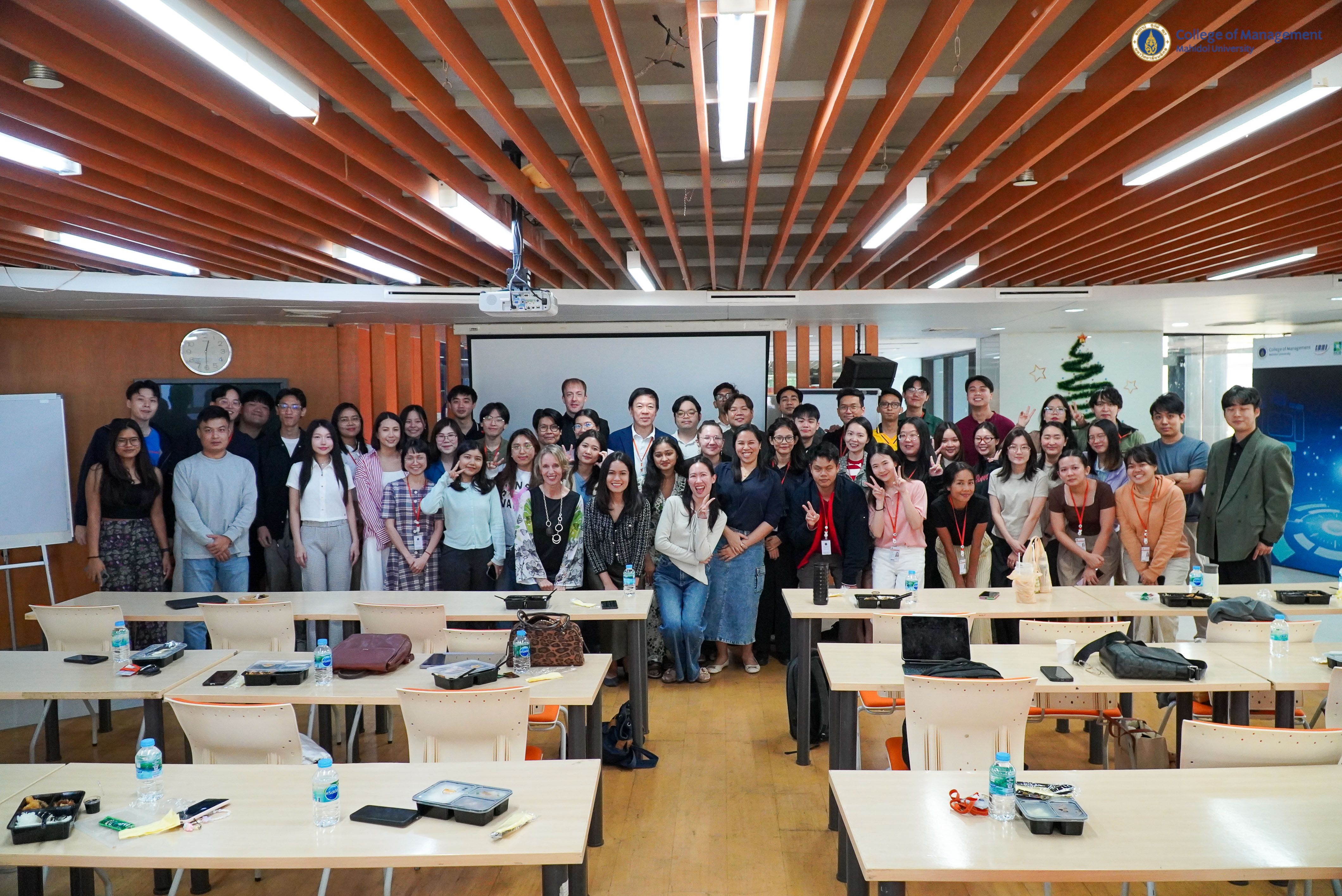
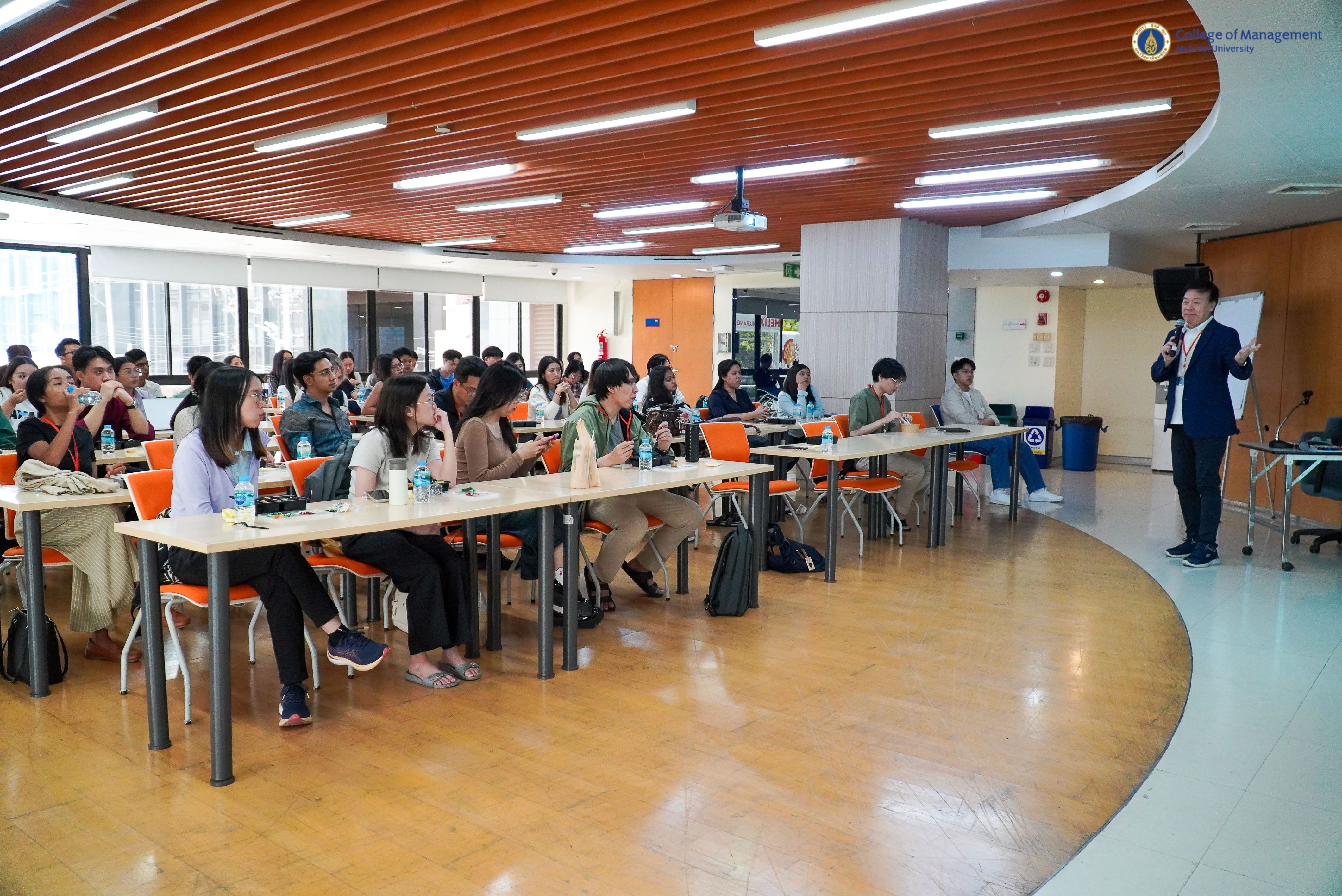
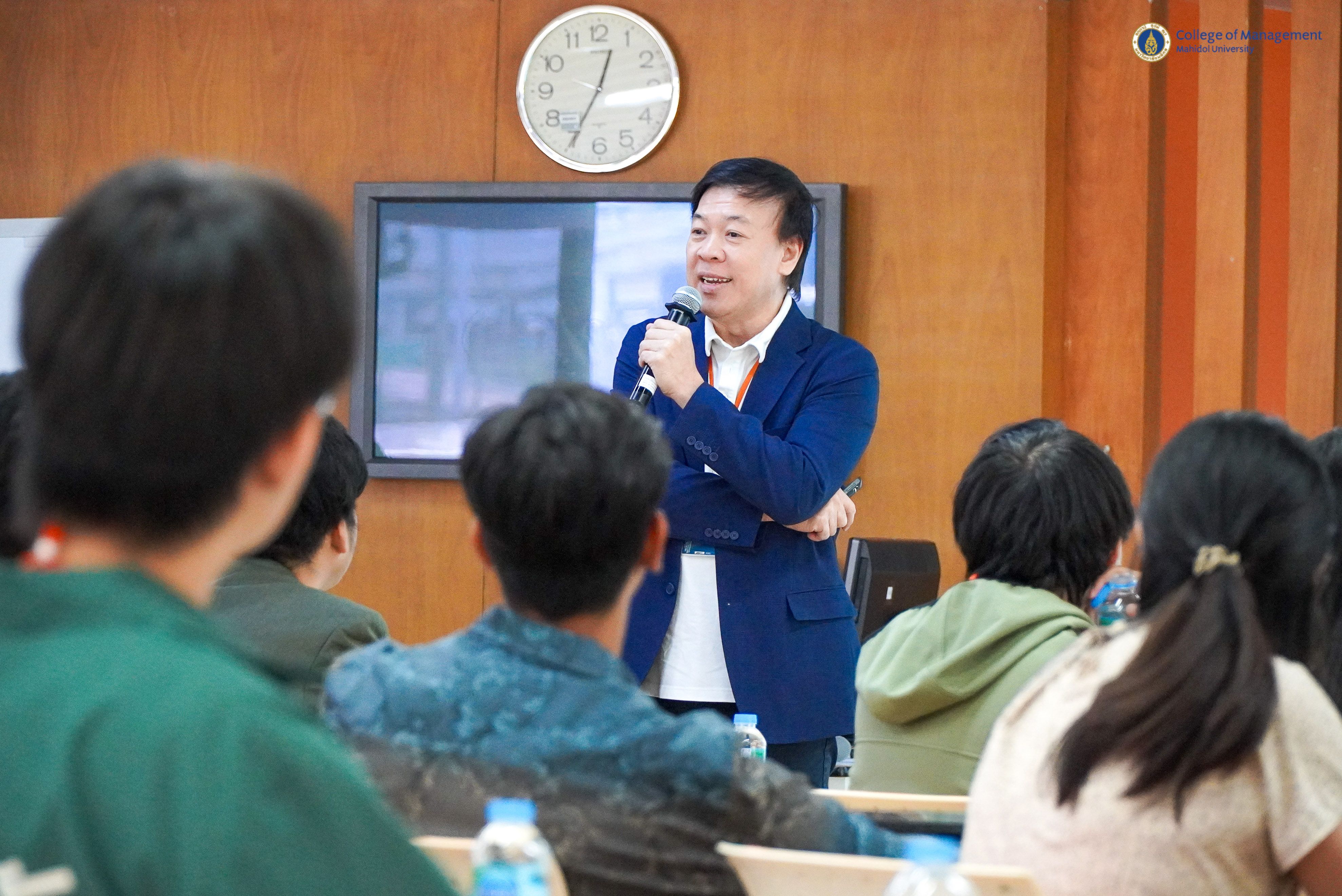
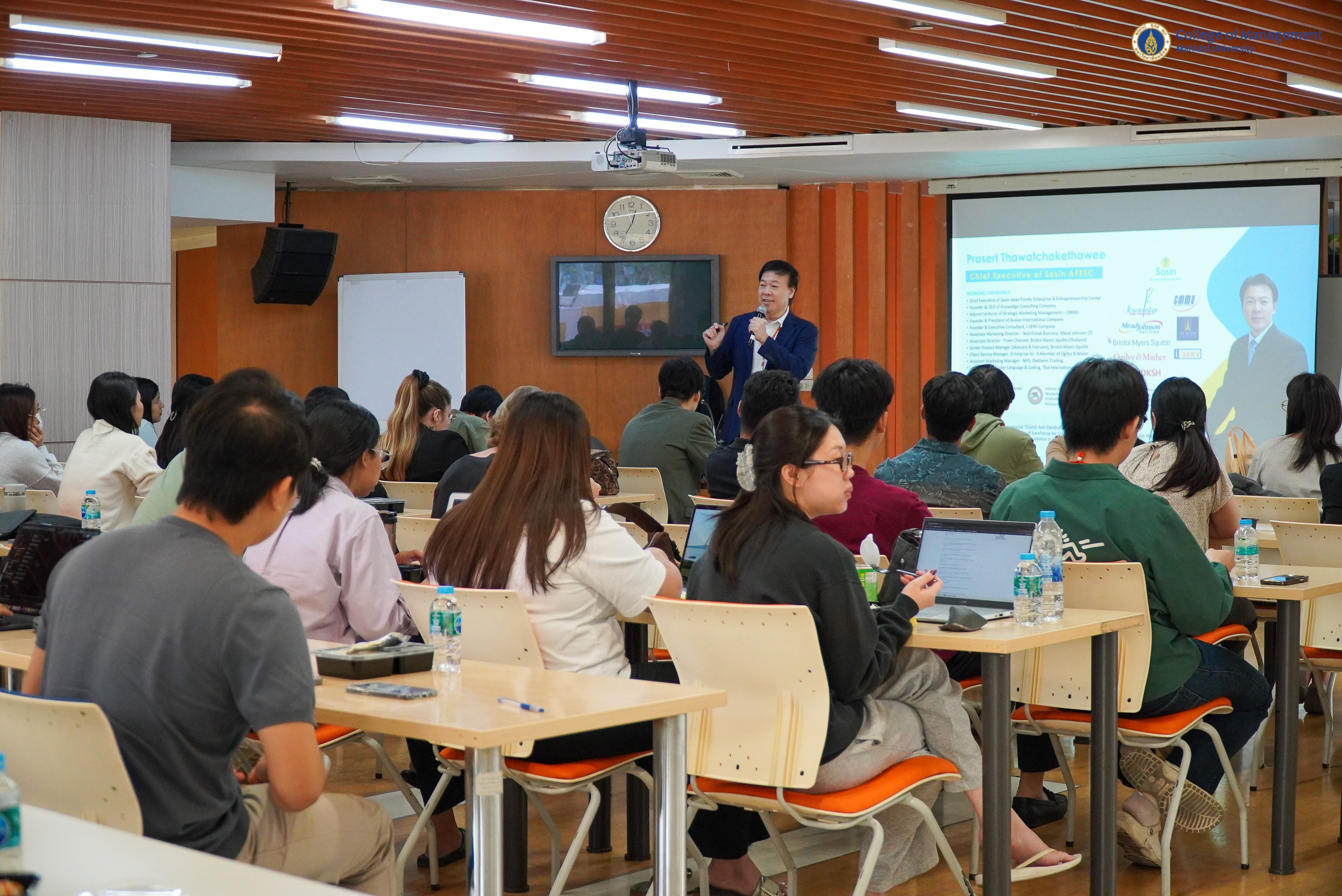
New Course Offering

Course Description
CURRICULUM
Courses Structure
| 1. Pre-Course | No Credit |
| 2. Required Courses | 21 Credits |
| 3. Elective Courses | 18 Credits |
| 4. Thematic Paper | 6 Credits |
| Total | 45 Credits |
Note: The course structure above applies to students following Plan B: Thematic Paper. If you choose to pursue Plan A: Thesis, please consult the program’s assigned educator for guidance.
Required Courses
- Strategic Marketing Management
- Financial Management
- Asian Economy in the Global Context
- Managing People in Organizations
- Managing Business Information and Emerging Technologies
- Strategic Management
- Decision Skills
21 Credits
(3 credits each)
Elective Courses
- Business Planning
- Small and Family Business Management
- Entrepreneurial Strategy and Competitive Dynamics
- Innovative Product/Service Design & Commercialization
- Start-Up and SME Financing
- Business Creativity
- Omni-Channel Retail Management
- Managerial Negotiation Strategy
- Project Management
18 Credits
(3 credits each)
Thematic Paper
- Digital Transformation & Change Leadership (Study Trip to NUS Singapore)
- International Business (Study Trip to Germany)
- Business Analytics
- Leading for Success
- Corporate Strategy in Competitive Markets
- Employee Selection
- Consulting Tools for Sustainability
- New Product Positioning
- Organizational Change
- Data to Intelligence
- Soft Skills Development
6 Credits
(1.5 credits each)
-
Graduated with Bachelor Degree Yes English Proficiency* 1. TOEFL ITP Examination with College or
2. Submit other English Profiency Score** (Optional)Prior Work Experience
Valued in all programs, but not required Remark
*Exemption for English Examination only for English native speaker and Student who graduated from US, UK, AUS, Canada, New Zealand, Ireland, South Africa and Singapore
** English Examination Score gained within the last 2 years -
Applicants are not required to submit any English proficiency test scores, as the College of Management, Mahidol University will provide the English Proficiency Test (TOEFL ITP) for all applicants free of charge.
English Proficiency Score*
English Examination Score gained within the last 2 yearsEntrance Score Graduation Score
(Writing : Speaking)1. MU ELT 84 84 (W:10 S:10) 2. MU Grad Plus 40 70 (W:10 S:10) 3. TOEFL IBT 32 64 (W:17 S:15) 4. IELTS 3.0 5.0 (W:5.0 S:5.0) 5. TOEFL ITP 400 520 -
Students who have satisfied the general requirements for admission or successfully transferred from Conditional Status will be admitted as Graduate Students. Successful completion of the Master's Program requires students to meet quality standards set by the College.
- Students must maintain status as active students during each trimester of study until graduation. Active status requires registration for a minimum of three (3) credit hours in a trimester.
- Students must earn an overall GPA of at least 3.0 in their Master's degree program.
- Students must pass a Written Comprehensive Examination to demonstrate their mastery of core material in the CMMU management curriculum.
- All students must demonstrate English proficiency prior to graduation: TOEFL ITP score of 520 which Is equivalent to TOEFL IBT 68, IELTS 5.0, or MU GRAD TEST 70.
Fixed-Rate Tuition Fees
| Item | Before 1st Term | Term 1 | Term 2 | Term 3 | Term 4 | Term 5 | Total |
|---|---|---|---|---|---|---|---|
| 1. Fixed-Rate Tuition Fee | - | 90,000 | 90,000 | 90,000 | 90,000 | 90,000 | 450,000 |
| 2. Entrance Fee | 44,000 | - | - | - | - | - | 44,000 |
| Total Academic Fees* | 44,000 | 90,000 | 90,000 | 90,000 | 90,000 | 90,000 | 494,000 |
1. Foreign students are required to pay an additional flat fee of 5,000 Baht per trimester.
2. Leave of absence and student status maintenance fees are charged in accordance with the university’s official announcement.
3. The Fixed-rate tuition fee shall apply to students admitted in the academic year 2026 and thereafter.
Admission Fee
2,500 Baht
Academic Fee
Entrance Fee
44,000 Baht
Fixed-Rate Tuition Fee
450,000 Baht
Total Academic Fee 494,000 Baht
For More Information
-
662 206 2000 ต่อ 3201 - 3208
-
Line Official: @cmmu
-
This email address is being protected from spambots. You need JavaScript enabled to view it.
DUAL DEGREE OPTION

MACQUARIE UNIVERSITY
Sydney, Australia
Tuition Fee
- 1st Degree 494,000 Thai Baht
- 2nd Degree 39,200 Australian Dollars (minus 10,000 AUD scholarship)
Program Details
Download
Program Requirements
- English Requirement:
TOEFL ITP 580 or IELTS 6.5 - Study Period:
CMMU required coursework (3 trimesters) and 1 year at Macquarie University (start in February or July) - Condition:
Defend thematic paper after returning to CMMU in order to graduate from CMMU
FREQUENTLY ASKED QUESTIONS (FAQ)
- We keep class size small to allow for interaction and practical learning activities
- We offer flexible study times (evenings and weekends)
- We provide study abroad opportunities at more than 30 partner universities worldwide
- We offer double degree and dual degree options in France and Australia
In a nutshell:
- Practice English, the global language of business, science and culture, while studying business. Five semesters of everyday exposure means, your English ability will improve quickly.
- Improve your job opportunities with multinational companies. It is increasingly common for MNCs to replace expats with locals. A diploma from the International Program signals that you have an international mindset and English proficiency.
- Improve your job opportunities with Thai companies seeking to expand abroad.
- Share classes and make friends with our many exchange students. In many of the elective courses, a third of the students are from abroad, leading to a stimulating, multi-cultural classroom environment.
- Have the experience of a lifetime studying abroad for one or two semesters at one of our nearly 40 partner schools around the world.
- Earn a dual degree with our affiliated schools: With one or two semesters abroad, you can earn a second Master’s degree from three prestigious universities: UTS (Australia), Macquarie University (Australia), and Toulouse University (France).
- Have a chance to attend a business project competition with our company partners such as Unilever and have an opportunity to work with them as a management trainee.
- Our international team of faculty members come from a variety of countries such as Austria, Belgium, Germany, the Netherlands, Thailand and the U.S. They have PhD degrees from well-known universities in Europe, the US and Australia, and actively publish in high-quality journals. Many have also taught at foreign universities and have industry experience.
- For those of you considering further studies or working abroad in the future, having a diploma from an English-language program improves your chance of admission.
No. Even though the language of instruction is English, our faculty use a mix of local and international examples. Using Thai examples can be useful to make the class topics more relevant. It should be said, however, that most of the frameworks, theories and best practices of business are universal. Our primary goal is to change the way you think and how you approach business problems, not to teach you details of the local market. There are also situations where international examples are preferable, for instance, to illustrate cutting edge management thinking from innovative companies around the world.
Can be a study of a specific company or case, or it can be broader, such as exploring a business opportunity or trying to understand motivations or satisfaction.
Each of these options (CP, CI, IS) add up to six credits, whereas a thesis is 15 credits, and is expected to be a more comprehensive project.
Thesis
A thesis requires a literature review of past relevant work, and then original research is conducted by the student and presented to an academic committee. Anyone potentially interested in Ph.D. study should consider either the IS or thesis option. Students with a full scholarship are required to write a thesis.
- Earn two degrees.
- Get a competitive edge and a better job when you graduate
- Obtain two degrees in only 5 terms (depending on the institution)
- Study in an international environment that will provide you the soft skills you need to boost your career
- Enjoy studying and living in a different environment.

Associate Professor
Simon Zaby, Ph.D.
Full-Time Faculty
13th Floor MU Building 69 Vipawadee Rangsit Road Samsennai, Phayathai District, Bangkok, Thailand 10400
-
662 206 2000 ext. 2109
-
Line Official: @cmmu
-
This email address is being protected from spambots. You need JavaScript enabled to view it.

Pimwipa Charatwisitkun (Pim)
EDUCATOR
CONTACT EDUCATOR
The office hours are as follows:
- Monday to Friday 10.00 - 18.00 hrs.
- Saturday - Sunday 8.30 - 16.30 hrs.
-
662 206 2000 ext. 3209
-
This email address is being protected from spambots. You need JavaScript enabled to view it. -
The office of educators is located on the 10th Floor.
Admission Enquiries
Samsennai, Phayathai District,
Bangkok, Thailand 10400
Tel: 662 206 2000
-
662 206 2000 ext. 3102 or 3104
-
Line Official: @cmmu
-
This email address is being protected from spambots. You need JavaScript enabled to view it.
